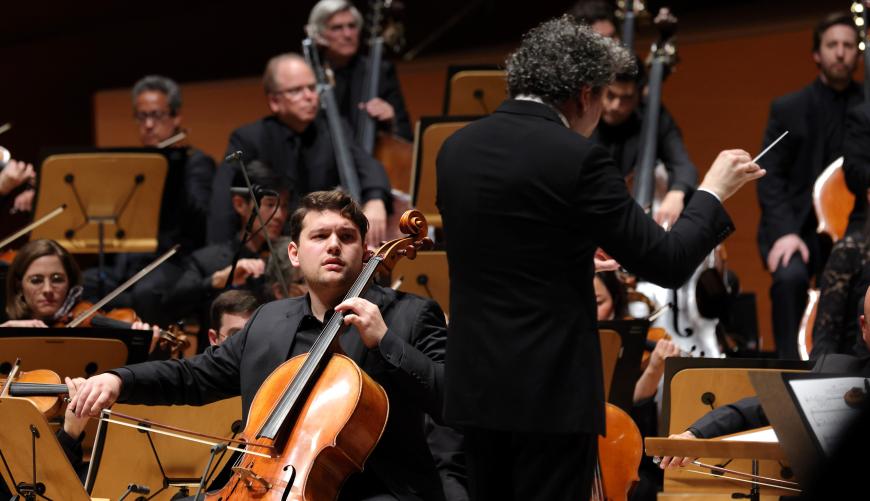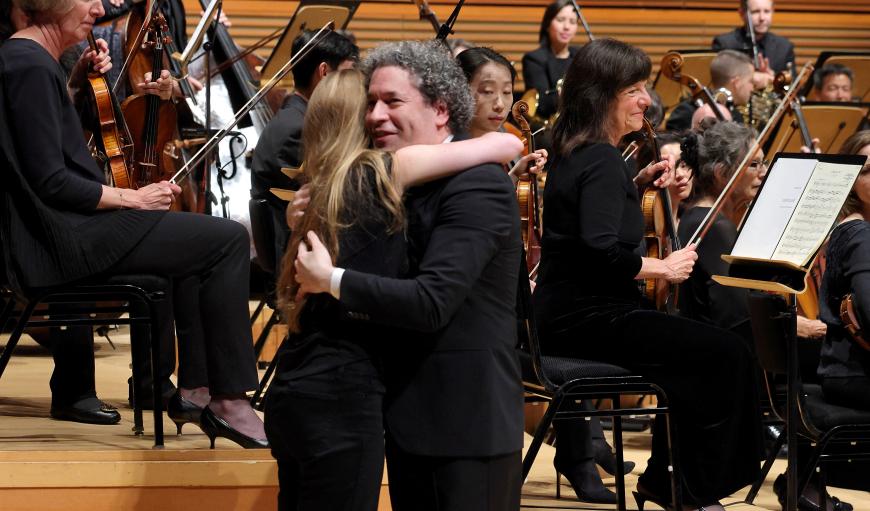
Even for the Los Angeles Philharmonic, the series of performances between May 18 and 27 were a remarkable achievement. It began with the orchestra’s music director emeritus, Esa-Pekka Salonen, conducting the American premiere of his Sinfonia Concertante for Organ and Orchestra (a real barn-burner), continued with the LA Phil-commissioned premiere of Dylan Mattingly’s six-hour mega-opera, Stranger Love (performed by the New York ensemble Contemporaneous), and culminated with the world-premiere performances of Ellen Reid’s West Coast Sky Eternal and Gabriella Smith’s Lost Coast: Concerto for Cello and Orchestra, conducted by Gustavo Dudamel.
Reid and Smith share a common belief that symphonic music can function as a force of nature. West Coast Sky Eternal unfolds as a kaleidoscopic refraction of string colorations, while Smith’s concerto (inspired by a five-day Emersonian immersion on California’s Lost Coast Trail) combines a celebration of nature’s power and grandeur with an urgent cry for help for a planet in peril.

In her program notes, Reid describes her piece as “a study in perspective ... that oscillates between the rhythm of life and a global sense of beauty and balance.”
West Coast Sky Eternal begins from the point of view of a solo violin and then expands into a multivoiced divisi texture that incorporates the full string section. And while one tries not to be too influenced by titles, it is very difficult not to imagine the music as a series of gathering and passing clouds: Fluttering and snap pizzicati are like the wings of a thousand butterflies. And while Reid speaks of the piece emerging from a time of personal emotional stress, the overall takeaway is pure joy.
If nature is a refracting lens of emotion for Reid, it is a full-body experience for Smith that fuses her ecological activism with the knowledge that nature is best experienced alone. Lost Coast (performed by Smith’s longtime friend and former Curtis Institute classmate Gabriel Cabezas) does not celebrate nature as an ode to joy. The scale is more tectonic, a clash of elemental forces as tumultuous as the crashing waves, as unpredictable as the trail ahead.

Speaking before the concert, Smith described the impact of backpacking for five days (in 2014) along jagged coastal cliffs and camping on isolated beaches where a tide table is an indispensable part of your gear. And then there was the isolation. “In all that time I was on the trail, I only saw one other person.” In the concerto, she explained, the cello metaphorically represents the ever-winding trail, while the full orchestra embodies the elemental force of the ocean.
Throughout the concerto’s three movements, Smith’s score calls on the cello soloist to produce the widest possible range of effects, beginning with an extended passage for open strings where the fingering flutters in a nether zone between notes and harmonics. Sections marked pianissimo, like ghostly whispers, are contrasted by elongated slurs from the cello and full ensemble that could be taken for whale song and the bellowing of sea lions.
Smith also includes boxes of controlled aleatoric improvisation for the strings, which Dudamel indicated by raising fingers to start each section.
If the expansive range of the cello represents the vicissitudes, hazards, and glories of the trail, Smith’s use of the orchestra is like an irrepressible force that ebbs and flows in the strings, resounds in the brass, glimmers in the winds, and crashes against the shore as a battery of percussion. It was La mer on steroids.
The question is: Will such a series of premieres ever happen again? Salonen seems firmly ensconced in San Francisco. Dudamel is heading for New York. And Chad Smith (the LA Phil’s CEO and the administrative wizard who had the chutzpah to commit to Stranger Love) is heading for the top job at the Boston Symphony. Rarely, if ever in its history, has the Philharmonic found itself in such a state of flux. Beginning Thursday, Dudamel will conduct the final concerts of the season. What lies ahead on the trail for the LA Phil seems a good deal less certain.




